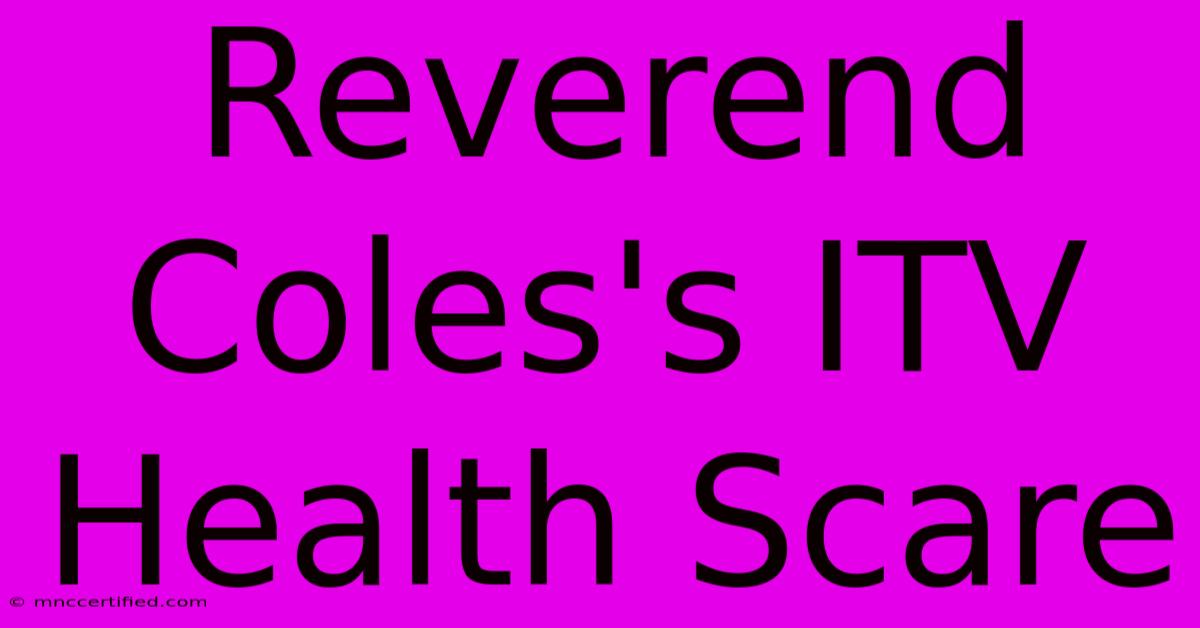Reverend Coles's ITV Health Scare

Table of Contents
Reverend Coles's ITV Health Scare: Fact, Fiction, and the Power of Media
Reverend David Coles's recent appearance on ITV, discussing his dramatic weight loss and health scare, sparked significant online discussion. This article delves into the details of the event, separating fact from speculation, and examining the broader impact of media portrayals of health issues.
The ITV Interview: What Happened?
Reverend Coles's interview detailed a rapid and concerning weight loss, attributing it to an undiagnosed medical condition. While the specifics of his health issues weren't explicitly stated on air, the visuals and his descriptions painted a picture of significant distress and a serious health battle. The interview focused on his journey, highlighting the emotional and physical toll of his illness, and emphasizing the importance of early diagnosis and seeking medical help. The segment aimed to raise awareness about the often-overlooked signs of underlying health problems. The emotional impact of the interview was undeniable, leaving many viewers concerned and prompting widespread online searches for related information.
Dissecting the Online Reaction: Fact vs. Fiction
Following the broadcast, social media buzzed with discussions about Reverend Coles's health. While many expressed concern and support, some commentary veered into speculation and the spread of misinformation. Online searches spiked for terms related to his described symptoms, leading to a surge in traffic on health websites, some of which may have provided inaccurate or misleading information. It's crucial to remember that speculation should be avoided, and viewers should rely on verified medical sources for information regarding their health.
The Dangers of Online Misinformation:
The internet’s accessibility also presents a significant challenge: the ease with which misinformation can spread. After the ITV broadcast, various online platforms saw the proliferation of unsubstantiated claims regarding the Reverend's condition and treatment. This highlights the importance of media literacy and critical thinking when consuming online health information. Always verify information with reputable sources like the NHS (in the UK) or the CDC (in the US).
The Power of Media in Health Awareness
Despite the potential for misinformation, Reverend Coles's interview serves as a powerful example of how media can raise awareness about health issues. By sharing his personal experience, he likely encouraged viewers to be more attuned to their own health and seek medical attention when necessary. This underscores the crucial role of media in public health education. The interview successfully generated conversation around a potentially serious health topic, motivating people to prioritize their well-being.
Promoting Responsible Reporting and Online Behaviour:
The Reverend's story highlights the importance of responsible reporting and consumption of health information. Media outlets have a responsibility to accurately and sensitively report on health issues, avoiding sensationalism or the spread of unsubstantiated claims. Similarly, viewers should prioritize credible sources and engage in critical thinking before sharing or accepting health-related information online.
Conclusion: Learning from the Experience
Reverend Coles's ITV appearance provides valuable lessons for both media outlets and the public. Responsible reporting, coupled with critical media consumption habits, is crucial for ensuring the accurate dissemination of health information. By promoting responsible sharing and fact-checking, we can harness the power of media to improve public health awareness effectively and safely. The incident serves as a reminder of the profound impact media has on shaping public perception and influencing health-seeking behaviours. Let's strive for accurate and empathetic reporting to promote better health outcomes for all.

Thank you for visiting our website wich cover about Reverend Coles's ITV Health Scare. We hope the information provided has been useful to you. Feel free to contact us if you have any questions or need further assistance. See you next time and dont miss to bookmark.
Featured Posts
-
Intech Investment Management Llc
Nov 22, 2024
-
Steelers Browns Final Score Cleveland Results
Nov 22, 2024
-
President Bidens Warrant Statement
Nov 22, 2024
-
Australia Vs India Day 1 Bumrahs Runs
Nov 22, 2024
-
Wilson Darnold Caleb Performance Boost
Nov 22, 2024